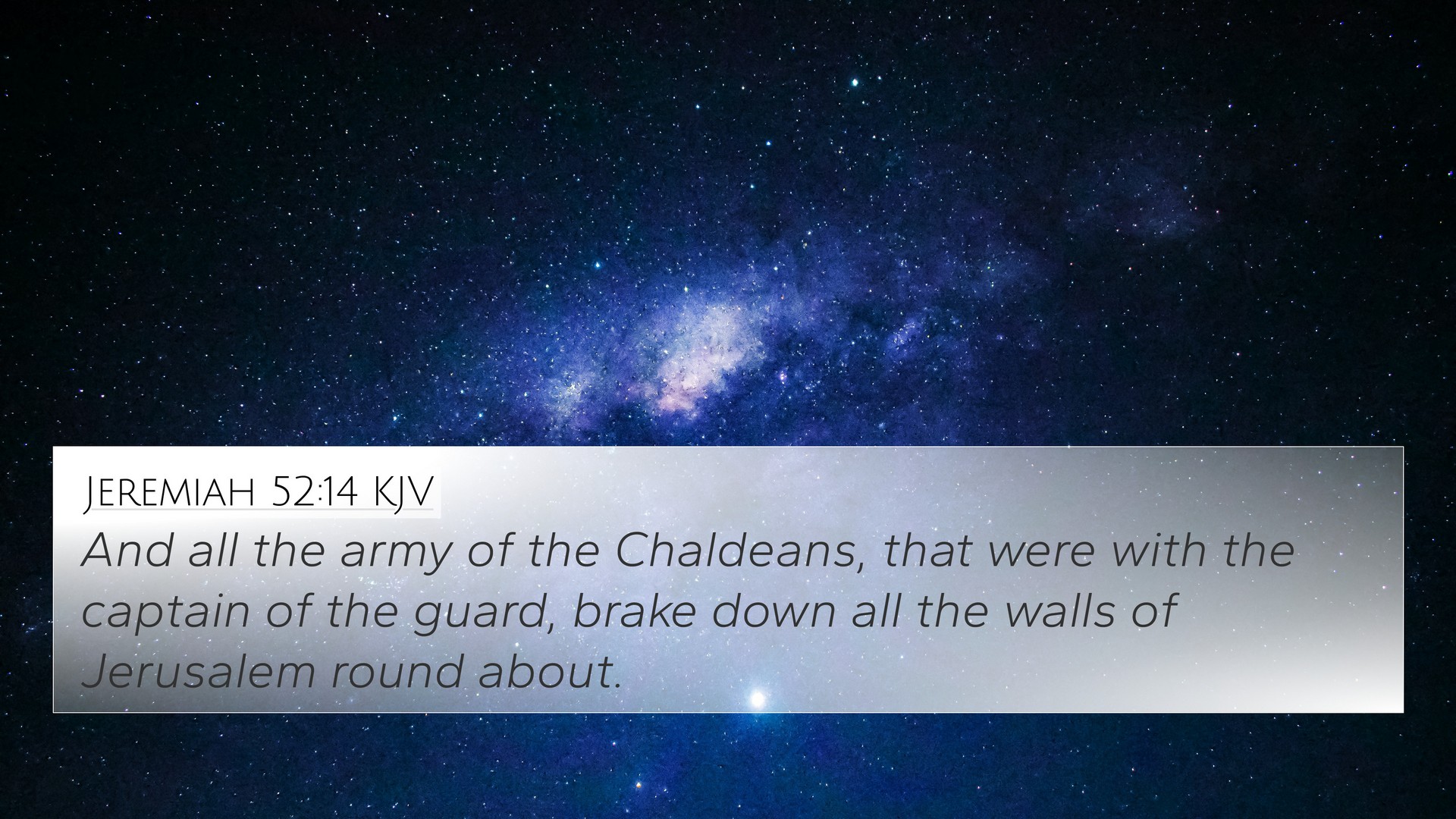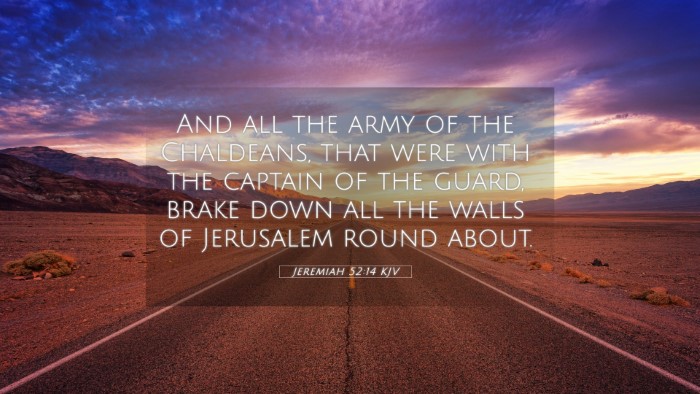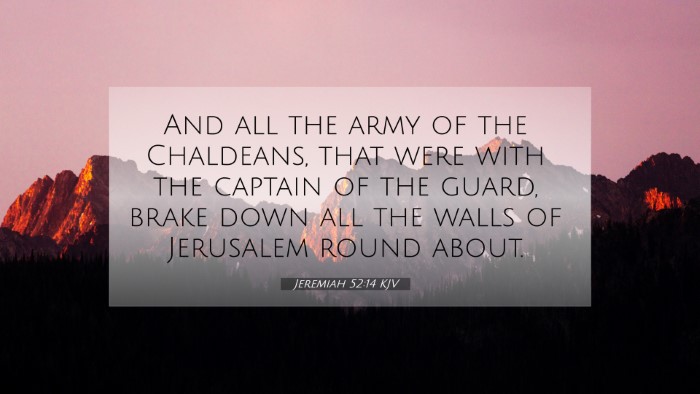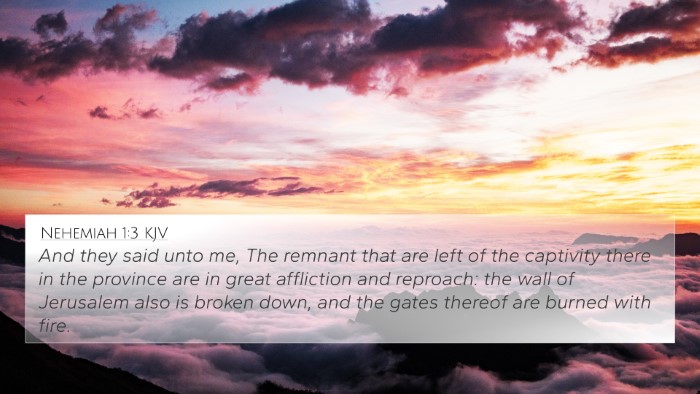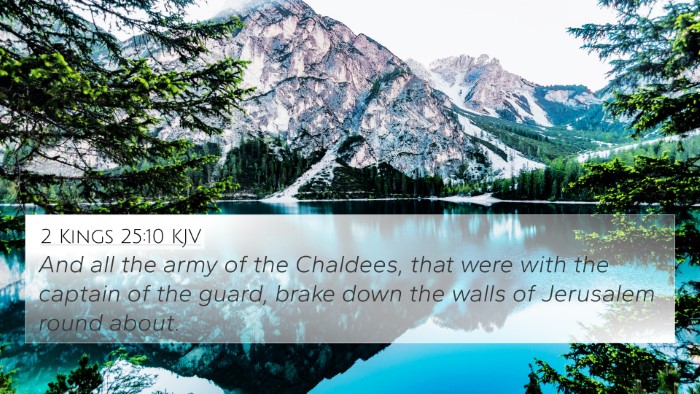Understanding Jeremiah 52:14
Verse Context: Jeremiah 52:14 states, "And all the army of the Chaldeans, that were with the captain of the guard, broke down all the walls of Jerusalem round about." This verse concludes the narrative of the Babylonian siege and the destruction of Jerusalem, marking a significant event in biblical history.
Summary of Verse Meaning
This verse demonstrates the finality of Jerusalem's destruction at the hands of the Chaldeans. Matthew Henry notes that the breaking down of the walls signifies the complete subjugation of the city, eliminating any defenses that once protected it. The act is emblematic of divine judgment, fulfilling the prophecies given through Jeremiah regarding the impending doom of Jerusalem due to its people's disobedience.
Commentary Insights
-
Matthew Henry:
Henry emphasizes the severity of this event. He explains that the city, once favored by God, now faced destruction because of its persistent rebellion. The wall's destruction serves as a testament to God's ultimate authority and a warning to others of the consequences of sin.
-
Albert Barnes:
Barnes highlights the strategic significance of the walls in ancient cities. Their destruction not only marked the fall of physical defenses but symbolized a deeper spiritual collapse. This event was part of God's plan to bring His people back to repentance.
-
Adam Clarke:
Clarke discusses the historical context of the Babylonian conquests. He notes that the fall of Jerusalem was not only a tragic moment for the Israelites but also a pivotal point in God's redemptive narrative, indicating a shift toward exile and eventual restoration.
Connecting Themes and Cross-References
The destruction of Jerusalem's walls is echoed throughout Scripture, with key connections to other biblical events and themes. Here, we explore significant cross-references that relate to Jeremiah 52:14:
- 2 Kings 25:10: This verse parallels the account of Jerusalem's destruction, highlighting the comprehensive dismantling of the city.
- Lamentations 2:8-9: Here, the lament for Jerusalem's walls captures the emotional and spiritual devastation of the city.
- Ezekiel 21:27: This verse reveals God's sovereignty over nations, affirming that the political upheaval serves divine purposes.
- Micah 3:12: Micah prophesied the destruction of Zion, which correlates with the events described in Jeremiah.
- Matthew 24:1-2: Jesus references the Temple's destruction, echoing the themes of judgment and collapse of spiritual institutions.
- Hebrews 10:26-31: This passage draws on the themes of judgment, linking to the prophecy of destruction for those who reject God.
- Revelation 21:2: The new Jerusalem represents hope after destruction, emphasizing themes of restoration following judgment.
- Daniel 9:16: This includes a prayer for Jerusalem, capturing the longing for restoration in the face of destruction.
- Jeremiah 39:8: This verse provides a direct account of the aftermath of Jerusalem's fall, reinforcing the devastation described in 52:14.
- Isaiah 25:2: The promise of devastation followed by rebuilding offers a theological framework for understanding God's redemptive work amid judgment.
Thematic Reflection
The destruction of Jerusalem's walls speaks to larger themes within scripture, such as:
- Judgment and Mercy: While the destruction signifies judgment, it is also a call toward future redemption.
- The Importance of Repentance: The events surrounding the fall of Jerusalem stress the necessity of returning to a right relationship with God.
- Hope in Restoration: The narrative of devastation ultimately sets the stage for the promise of a new covenant and future restoration, as seen in the New Testament.
Tools for Bible Cross-Referencing
For deeper understanding, various tools can enhance study, including:
- Bible Concordance: Use a concordance to find related scriptures based on key terms.
- Bible Cross-Reference Guide: Guides that offer structured cross-references can aid in thematic studies.
- Bible Reference Resources: Online resources provide searchable access to numerous cross-references across translations.
- Bible Chain References: Following chains of scripture helps in exploring linked verses and themes.
- Comprehensive Bible Cross-Reference Materials: Such materials present extensive lists of related verses for in-depth study.
Conclusion
Jeremiah 52:14 serves as a pivotal reflection on the consequences of sin and the weight of divine judgment. Through the lens of public domain commentaries, we recognize the devastating loss of Jerusalem's walls not only as a historical event but also as a thematic connection to the overarching narrative of redemption in the Bible. The cross-references provided connect this verse to a broader biblical discourse, illustrating the importance of context in understanding scripture. As we explore connections between Bible verses, we unveil complex dialogues within the text, inviting believers to consider the rich thematic tapestry woven through God's Word.
Keywords: Bible verse cross-references, connections between Bible verses, linking Bible scriptures, comparative Bible verse analysis, Bible verses that relate to each other, cross-referencing Biblical texts, thematic Bible verse connections, Bible verse parallels, scriptural cross-referencing, inter-Biblical dialogue.
